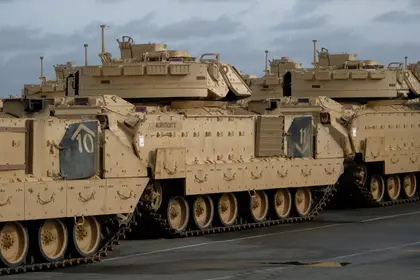Ukraine will soon receive M1 Abrams tanks from the United States as Kyiv's forces steadily advance in their counter-offensive against Moscow's troops, US Defence Secretary Lloyd Austin said on Tuesday.
Representatives of dozens of countries that support Kyiv are meeting in Germany to discuss new aid for Ukraine ahead of an address to the UN General Assembly by the country's president, Volodymyr Zelensky.
JOIN US ON TELEGRAM
Follow our coverage of the war on the @Kyivpost_official.
Washington had promised the 31 tanks to Kyiv at the start of the year, part of more than $43 billion in security assistance pledged by the United States since Russia invaded Ukraine in February 2022.
"I'm... pleased to announce that the M1 Abrams tanks that the United States had previously committed to will be entering Ukraine soon," Austin said at the opening of the Ukraine Defence Contact Group.
A senior US military official said the first tanks will be sent in the coming days and the process completed within weeks.
The tanks will be paired with 120mm armour-piercing depleted uranium rounds. Such munitions are controversial due to their association with health problems, such as cancer and birth defects, in areas where they were used in past conflicts, although they have not been definitively proven to have caused them.
The decision to provide Abrams tanks to Ukraine represented a U-turn as American defence officials had repeatedly said they were ill-suited for Kyiv's forces due to their complexity.

What if Russia Wins?
Zelensky arrived in the United States on Monday, visiting wounded Ukrainian troops at a hospital ahead of his UN address, which he will make as the country's forces push ahead with a slow-moving, high-stakes counter-offensive to wrest back territory from Russian forces.
Ukraine's limited progress against entrenched Russian positions has spurred debate among Kyiv's Western allies over its military strategy. But on Monday, Ukraine's defence ministry said it had recaptured a total of seven square kilometres (nearly three square miles) last week near the eastern town of Bakhmut and also along the southern front.
Austin said Tuesday that the counter-offensive "continues to make steady forward progress. And brave Ukrainian troops are breaking through the heavily fortified lines of Russia's army of aggression."
The US defence chief also welcomed new Ukrainian defence minister Rustem Umerov, who was appointed earlier this month in a significant change for Kyiv, following corruption scandals at the ministry.
A senior US defence official said ahead of the meeting that the gathering provided an opportunity "to hear from minister Umerov himself what his vision is, what his priority is."
"Democracies like Ukraine have... turnover in leadership all the time," the official said, adding: "We do expect continuity (from Kyiv)."
US officials have spearheaded the push for international support for Ukraine, quickly forging a coalition to back Kyiv after Russia invaded and coordinating aid from dozens of countries through near-monthly Contact Group meetings.
As Kyiv reported that its air defence systems had downed 27 Shahed drones launched overnight in Russia's latest aerial barrage, Austin in Ramstein urged allies to "continue to dig deep" on such systems for Ukraine as they are "saving lives".
Ahead of the latest meeting, Germany announced it will give another 400 million euros ($428 million) of weapons and aid to Ukraine. This will include ammunition, armoured vehicles and mine-clearing equipment, Defence Minister Boris Pistorius told top German tabloid Bild.
"Ammunition is what Ukraine needs most in its defensive struggle against the brutal war of aggression," he said.
Ukraine's supporters have also provided training to Kyiv's troops, while the United States and other countries have imposed tough sanctions on Russia.
The targets of the sanctions include financial institutions, technology imports and energy exports.
You can also highlight the text and press Ctrl + Enter






